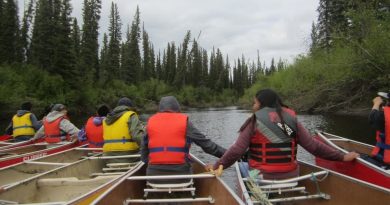N.W.T. premier says he wants complete carbon tax exemption for territory

· CBC News
Pressure has been on federal government to extend exemptions
Canada’s newest premier says that in an ideal world, Ottawa would provide his territory with a blanket exemption from the carbon tax.
“I mean, ideally, a complete exemption for the territory is what we would hope for,” said R.J. Simpson, chosen this week as premier of the Northwest Territories, in an interview Sunday on Rosemary Barton Live.
“The costs are already high — higher costs are not the solution up here.”
The carbon pricing framework set up by the federal government requires provinces to implement their own systems that are in line with federal standards, or use the federal system that’s in place. The N.W.T. has its own carbon pricing system, rather than relying on the federal backstop as some other provinces do.
That means if the territory wants to change its system to reflect shifts in the federal scheme — such as the exemption on home heating oil — it may have to do so through its own processes. The territory had previously revised its system to end rebates for heating fuels in April.
But the territory’s legislature was dissolved in mid-October for an election campaign that concluded around a month later, meaning it was not sitting at the time the federal government announced its exemption for oil used in home heating in late October.
‘Carbon tax simply “doesn’t work” for the N.W.T.’ says premier
Speaking just after his selection as premier, Simpson said the carbon tax simply “doesn’t work” for the N.W.T.
“Here in the Northwest Territories, the cost of living is high. The cost of fuel, home heating, power — they’ve always been high. [If] high costs is what is going to get people to use green energy and green technology, we would have been doing that years ago,” he said Sunday.
But a lack of infrastructure, connection to southern power grids and other factors make it hard to implement those technologies, he said.
“Heat pumps don’t work up here in this climate,” he said. Some heat pumps, such as conventional air-source heat pumps, tend to struggle in colder temperatures.
“We all agree we need to reduce our greenhouse gas emissions. Climate change is real, I can tell you we are being impacted here in the North more so than the rest of the country,” he said, noting that he had been evacuated from his own home for two months this year.
The Northwest Territories experienced devastating fires over the summer that prompted an evacuation order for Yellowknife and other communities, such as Hay River, where Simpson lives.
Cost of living challenge putting on pressure
Simpson said residents of the territory are experiencing an acute cost of living challenge.
“The prices in the rest of Canada are getting close to what they actually used to be here, so the prices are just getting higher and higher here,” he said.
Prime Minister Justin Trudeau has been adamant that there will be no further exemptions to the carbon tax. A number of premiers have pushed for the federal government to extend the exemption on home heating oil to all fuels used for home heating.
Conservative Leader Pierre Poilievre has been consistent in his “axe the tax” message. The party recently engaged in a number of procedural delay tactics in order to try to pressure the federal government to pass a bill extending carbon tax relief to some farmers and create a new exemption for First Nations.
“You will have no rest until the tax is gone,” Poilievre said earlier this week.
Assistance needed on infrastructure, adaptation
Simpson also noted that the territory would be asking the federal government for more help to deal with issues around infrastructure and climate change adaptation.
“The fact is, we need major infrastructure upgrades and we can’t afford those ourselves, as a territory,” he said. He noted the extensive evacuations over the summer and the fact that many residents had spent weeks or months away from their homes.
“It’s just not sustainable.”
Related stories from around the North:
Canada: MLAs in Canada’s Northwest Territories to hear from public on carbon tax changes, CBC News
Greenland: Climate change accelerating ice loss from peripheral glaciers, Eye on the Arctic
Norway: Will the green transition be the new economic motor in the Arctic?, Eye on the Arctic
Russia: More Russian Arctic oil via Murmansk redirects to India, The Independent Barents Observer
Sweden: Sweden’s climate policies closer to reaching goals, Radio Sweden
United States: Bering Sea ice at lowest extent in at least 5,500 years, study says, Alaska Public Media



